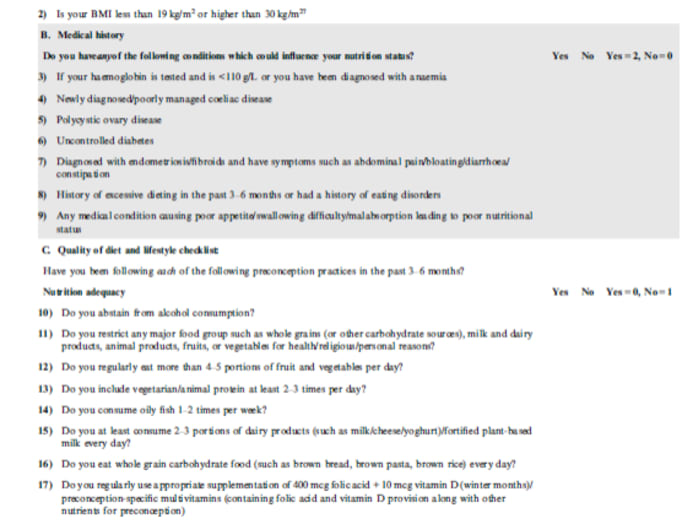Women and pregnancy: How diet and nutrition play a role when you’re trying for a baby
A Singapore-based scientist has developed an assessment tool that can help women identify if they need to make diet changes before trying to conceive. She tells CNA Women how, in an ideal world, every couple should see a fertility dietitian.

The health, diet and lifestyle of a couple three to six months before they try to get pregnant can have an impact on their chances of conceiving. (Photo: iStock/Kiwis)
Important news for couples trying to conceive (TTC): The state of your and your husband’s nutritional health in the months prior to getting pregnant can affect the quality of your egg and his sperm.
Said clinical dietitian Associate Professor Claire Pettitt, from the Singapore Institute of Technology Health and Sciences Cluster: “It takes around two months for sperm to develop and mature. For a woman’s egg to mature prior to ovulation, it takes about three months.”
The knock-on effect of good nutrition: Sperm and egg quality have an impact on conception.
WHY NUTRITION COUNTS WHEN YOU’RE TRYING FOR A BABY
What you eat prior to conception influences your body and weight. And having certain health conditions can have a negative impact on your nutritional status, which then affects fertility.
These health conditions are wide-ranging but some common ones include diabetes, disordered eating, coeliac disease, and polycystic ovary syndrome (PCOS).

In such cases, women with pre-existing conditions who are trying to conceive would benefit from getting dietary help.
Using coeliac disease as an example, a condition defined as the immune system attacking your body’s tissues when you consume gluten, Assoc Prof Pettitt said: “Having coeliac disease without proper care can lead to malabsorption of nutrients that can lead to deficiencies. Common ones include a lack of iron, vitamin B12 and folate, and these all have important roles to play in reproductive health.”
NUTRITION ASSESSMENT – A TOOL OF INSIGHT
Assoc Prof Pettitt and a group of dietitians from the United Kingdom recently developed an assessment tool that helps with nutrition.
In their combined clinical experience, Assoc Prof Pettitt said she and her colleagues saw women who were undergoing in-vitro fertilisation (IVF) and also women who were actively trying to conceive.
The observation was that having an assessment tool would better serve them for their pre-conception health.
This tool, in the form of a quiz, aims to evaluate nutrition needs, lifestyle factors and habits, all of which are important for overall health and crucial to women who are TTC.
It can be self-administered or done by a healthcare professional. It is split into lifestyle habits, medical history, existing health conditions and nutrition.

“We wanted to create a tool that was easy to administer, based on the latest scientific evidence that can help people identify if they might benefit from diet changes and that may translate to seeing a nutrition professional such as a dietitian,” Assoc Prof Pettitt said.
Through a series of questions which provides a simple score from 0, 1 and 2, the results determine whether a woman requires dietitian support or resource exposure via webinars, nutritional factsheets or even a group education session.
She added: “Much of the research available now is observational work, not interventional. We can see a trend or a potential link between dietary factors and fertility. However, the research isn’t conclusive that a particular diet or lifestyle factor has a specific effect on fertility.
“In an ideal world, I would encourage every couple looking to conceive, to see a fertility dietitian. This is because each couple has their own unique circumstances, lifestyle, way of eating, and health concerns. Therefore, nutritional advice should be tailored to the individual or couple.”
MAKING THE RIGHT FOOD CHOICES FOR FERTILITY
The existing observations show that health, diet and the lifestyle of a couple three to six months before they try to get pregnant can impact their chances of conceiving, influence the health of the egg and sperm, pregnancy outcomes and child’s health. This is in addition to genetics, existing health conditions and age.
According to this study, tweaks in your diet will have a positive effect on fertility.
Having a diet which includes folic acid, Vitamin B12, and Omega-3 fatty acids proved to be helpful for couples trying to conceive without any assisted reproductive technologies.
In addition, partaking in a Mediterranean diet also improves fertility. It has already been found to help with weight management, lower heart disease and support brain function.

The diet encourages intake of fish, seafood, fresh vegetables, whole grains, legumes and fruit. It includes eating less red meat, and discourages foods that have added sugars, refined oils and grains, plus other highly processed foods such as fizzy drinks. Olive oil, nuts and seeds are its healthy sources of fat.
One study found that the Mediterranean diet helped improve total sperm count, sperm concentration and even sperm motility for men while another study associated the diet with higher chances of achieving clinical pregnancy (for example, IVF) and a successful live birth amongst women under 35.
Recent research by the American Heart Association has indicated that this diet also reduced the incidence of preeclampsia in expectant mothers.
WHAT’S NEXT FOR FERTILITY NUTRITION?
Developing the assessment tool for more widespread use is the next aim, according to Assoc Prof Pettitt.
The tool can be used as an industry marker for women who are trying to conceive, so fertility clinics, and doctors in obstetrics and gynaecology, can use it to guide women from the get-go.
The hope is to have Singapore’s Ministry of Health officially test and validate the assessment tool for the Singapore population.
Locally, beating the sugar levels in our Asian diet is the biggest struggle. To up your chances of conceiving, Assoc Prof Pettitt asserted: Limit sugary drinks such as fizzy drinks and bubble tea, or sweets like dessert and confectionery.
“The earlier couples think about making dietary and lifestyle changes, the better. Six months is a good starting point as it gives enough time to form new habits that optimise egg and sperm health for conception,” she said.
CNA Women is a section on CNA Lifestyle that seeks to inform, empower and inspire the modern woman. If you have women-related news, issues and ideas to share with us, email CNAWomen [at] mediacorp.com.sg.









